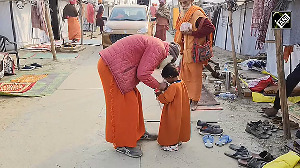'Women are taking on key roles in warehouses, such as picking and packing, as well as in our last-mile operations across India.'

India's e-commerce industry is increasingly creating opportunities for women, hiring them in large numbers this festival season to cater to the surge in sales.
E-commerce firm Flipkart announced that its supply chain expansion will generate over 100,000 job opportunities across India to meet high demand during the festival season.
The company has launched 11 fulfilment centres across nine cities. Among the blue-collar workforce hired for this festival season, Flipkart reported a 24 per cent increase in women employed compared to The Big Billion Days sale event in 2023.
Prajakta Kanaglekar, vice-president of supply chain, tech, and CxHR at Flipkart, said that as the e-commerce sector evolves, the representation of women in traditionally male-dominated roles, such as warehouse operations and last-mile deliveries, is increasingly recognised as essential for unlocking new efficiencies and perspectives.
"These women are taking on key roles in warehouses, such as picking and packing, as well as in our last-mile operations across India, contributing to our growth and strengthening our operational capabilities," said Kanaglekar.
Among them is Kiran Rawat, a delivery executive (wishmaster) at Flipkart in Rishikesh, Uttarakhand.
To meet the increased demand during the festival season, Rawat noted that Flipkart provides her with constant support and guidance for smooth deliveries across the far-flung areas of Rishikesh.
"The flexible hours have allowed me to manage both my job and my family, which is especially important as a mother," said Rawat.
Archana Kumari, a single mother working as a wishmaster at Flipkart in Shimla, found a supportive community in her role.
"The comprehensive training has equipped me with the skills and confidence to deliver 30 to 50 packages daily, even in remote areas," said Kumari.
The logistics sector has long been perceived as male-dominated. However, this perception is evolving as more women join the operations workforce.
Amazon India said it is leading this shift, with women now holding diverse roles across its operations network, ranging from team leaders and delivery associates to managers at delivery stations and even entrepreneurs spearheading delivery service partner programmes.
The company emphasised that this expansion of the female workforce is supported by its focus on flexible work models, targeted training, and safer workplace environments.
Amazon India has created over 110,000 seasonal job opportunities across its operations network to serve millions of customers throughout India during the festival season.
The company has hired thousands of women associates as part of its seasonal job opportunities.
"Our initiatives support women in various roles, demonstrating that with the right support and opportunities, they can thrive as associates, leaders, entrepreneurs, and key contributors to the industry," said Karuna Shankar Pande, vice-president of Amazon Logistics, India.
One example is Christina Rindiki, the entrepreneur behind Amazon's first all-women partner delivery station in Northeast India.
Growing up in Mizoram, where opportunities for women were limited, Rindiki established an all-women delivery station in Champhai, near the Myanmar-India border, with Amazon's support.
This initiative is part of Amazon's broader commitment to creating all-women delivery stations, offering roles from station managers to delivery associates.
Women at these stations receive comprehensive training in customer service, package handling, safety protocols, and technology.
Amazon also ensures a supportive work environment through feedback mechanisms and a dedicated helpline.
Fashion retailer Myntra announced that its recently concluded Big Fashion Festival (BFF) was powered by women in various supply chain and contact centre roles.
This year's BFF is the firm's largest edition to date, registering 627 million user visits -- a big increase from last year's 460 million visits.
"For this year's event, we hired and trained several delivery partners, including women," said Moitry Bhargav, area lead for the Delhi-National Capital Region, supporting Myntra BFF.
India's festival season is expected to ignite a major boost for the country's e-commerce sector, with sales projected to reach Rs 1 trillion to Rs 2 trillion in gross merchandise value, according to an analysis by Redseer Strategy Consultants.
The analysis forecasts 20 per cent year-on-year growth, fuelled by high pent-up demand and a wave of premiumisation.
Feature Presentation: Ashish Narsale/Rediff.com












 © 2025
© 2025